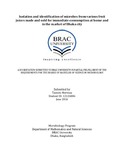| dc.description.abstract | Millions of people around the world are widely consuming fruit juices in every season as it provides an easy and affordable source of nutrients to them. The study was conducted to estimate the microbial quality of various fruit juices made and sold for immediate consumption in home and in the market of Dhaka city. Altogether, 10 fruit juice samples (5 different packed fruit juices and 5 freshly homemade fruit juice) were collected from different areas of Dhaka city and tested for their microbiological quality. Microbial quality was determined by quantifying the total viable count, total Staphylococcal count, total Salmonella count, total coliform count and total fecal coliform count. In this study, pH of the fruit juices varied from 2.8 to 3.8. The highest count of total viable organism was 2.3x106 cfu/ ml, total Staphylococcal count was 1.4x104 cfu/ ml, total coliform count was 1.75x104 cfu/ ml, total fecal coliform was 5.75x103 cfu/ ml and total Salmonella count was 3.5x104 cfu/ ml. It was found that, out of 10 fruit juice samples 3 different juice samples (orange, pomegranate, grape) contained E. coli, 4 different samples (mango, orange, litchi) contained Staphylococcus spp., 3 different samples (grape, jujube, mango) contained Bacillus spp., 2 different samples (pomegranate and litchi) contained Pseudomonas spp., 4 different samples (grape, jujube, litchi, orange) contained Moraxella spp., 2 different samples (jujube and litchi) contained Klebsiella spp., jujube juice sample contained Salmonella spp., pomegranate juice sample contained Shigella spp. and some other different organism such as Listeria spp., Clostridium spp., Acinetobacter spp., Brevibacterium spp., Acetobacter spp. and Francisella spp. had been identified from the tested juice samples. In this study, antibiotic susceptibility test was done from collected isolates from juice samples. This study specially highlights the level of microbial loads found in various fruit juice samples. | en_US |

